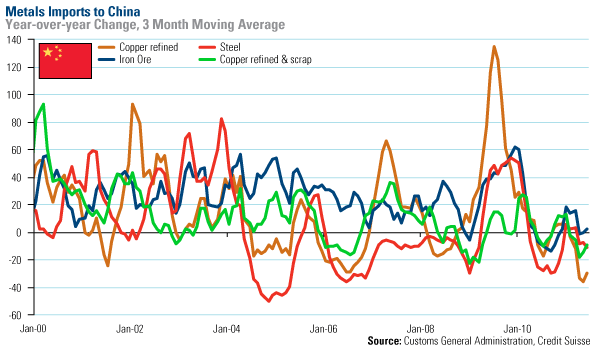The ongoing crisis in Europe has not only affected emerging markets, it has also negatively influenced the price of many commodities. UBS states that an “escalating bank funding stress in Europe is forcing a profound deleveraging process.” As U.S.money markets have been forced to pull their funds out of Europe, the short-term financing markets, which include commercial paper and trade finance, have been stressed and have weakened industrial and commercial credits. Companies involved in the trading and movement of commodities have had to run their businesses for cash, resulting in the disruption of commodity shipments.
This is clearly a negative for commodity prices in the short-term, but we believe the effects have already been priced into the market. Also, UBS indicates that this has pushed commodity inventories to “unsustainably low levels” and once credit conditions improve, demand should increase.

Imports of major metals to China are already running low, says Credit Suisse. While the year-over-year change in iron ore imports is at the same level as last year, copper imports are at an 11-year low, based on its year-over-year percent change.
So, if you’re counting the market’s cards, you can see that nearly all of the bear market’s aces have been played. Now that China’s PMI has turned upward, along with the potential for China’s monetary policy easing, it’s possible we’ll see a run in commodities through Chinese New Year.
From the article entitled, “Do Bullish Investors Have an Ace in the Hole?” by Frank Holmes. Frank Holmes is chief executive officer of U.S. Global Investors – a registered investment adviser that manages approximately $2.8 billion. The information provided herein has been provided to MiningFeeds.com by the author and, as such, is subject to our disclaimer: CLICK HERE.



 Follow us on Twitter
Follow us on Twitter Become our facebook fan
Become our facebook fan










Comments are closed.